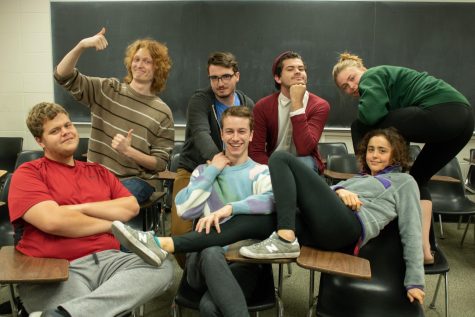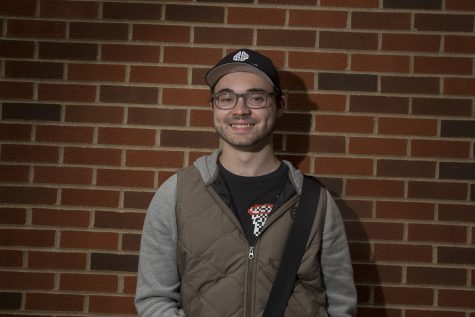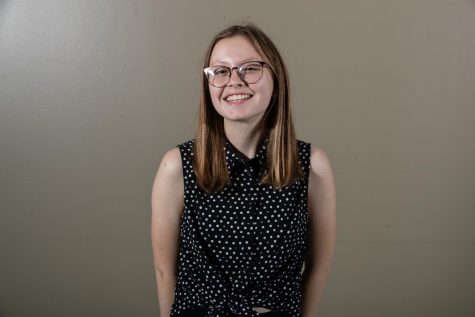International Writing Program brings unique talent from around the globe
The International Writers Program allows writers to get a taste of life in Iowa City.
September 26, 2018
Twenty-eight writers from 27 countries. Numerous genres. One program. Enough with the numbers; the University of Iowa’s International Writing Program is all about the words, no matter the language.
“We try to get as diverse a range of writers as possible,” IWP Director Christopher Merrill said. “We read applicants’ work closely and search for those who are engaged in a high level of writing.”
According to the IWP’s website, the program was formed to bring diversity in literature to the university. Since its founding in 1967, the program has welcomed 1,400 writers with geographically diverse backgrounds. In order to participate in the program, the applicant must be able to speak proficient English and have published at least one book. The 11-week residency provides a space for selected artists to immerse themselves in a foreign country and collaborate with a breadth of talented peers.
“The IWP is an essay in diversity, since it brings together writers from so many different places, each of whom reveals that world literature is much larger and stranger than we might imagine,” Merrill said in an email to The Daily Iowan.
The writers who come to the UI have the opportunity to explore Iowa City as a writing playground, whether participating in the Iowa City Book Festival, doing an intimate reading at Prairie Lights, or working with actors in the UI’s Division of Performing Arts to put on readings of their work. Be it playwrights from Pakistan or performance artists from Lithuania, the program brings a wide variety of writing talent to the UI each year.
Bejan Matur, a poet and nonfiction writer from Turkey, writes poetry that reads like a song. Her 1997 piece “Ceremonial Robes” uses dark imagery, ranging from death, innocence, emptiness, desolation, and rot. “Perhaps history is a mistake says the poet,” she writes in the piece. “mankind’s a mistake says god, I’m here to correct it but too late.” Her works twist through darkness and reflections of family, self, and God.
Umar Timol, a poet and fiction writer from Mauritius, an island nation near Madagascar, writes scintillating prose. His piece “Diary of an Old Mad Woman” is a scathing, funny, and sharp-witted piece, written from the perspective of an old woman, that touches on clichés, coming from an island country, colonialism, marriage, and escaping the mediocrity of life. The constant corrections in which the woman states what’s on her mind but then corrects it to the societal expectations, fully reveal through that and other tools the role that she plays in her life compared to the person that she is.
“Sad spectacle or an ordinary one. It’s up to you,” Timol writes.
RELATED: World literature comes to Lit City
Nigerian fiction and nonfiction writer Amara Nicole Okolo‘s piece “The Things We Never Say” provides intensely honest introspection on the power of a mother’s love and her life in intense detail that thrusts the reader into the tenderest moments between a mother and daughter and the brutal moments of abuse from the father. Readers can taste the fear, rage, and panic that comes along with it. Okolo paints a vivid picture in but seven pages of writing that are engaging and encapsulating.
Chandramohan Sathyanathan of India writes poetry that provides criticism and insight on modern societal and political issues, from his poem “Thirteen Ways of Looking at a Black Burkini” to “Plus Size Poem” to “UAPA,” a protest poem against the Unlawful Activities Prevention Act enacted in India that enables the government to put restrictions on the freedom of speech, freedom to assemble, and the freedom to form associations if they are deemed to be a risk to the nation.
“It is contagious,” he writes. “If your friends protest your Being injected with this virus, They too get infected. The virus attacks after long gestation periods Of surveillance.”
Each writer brings her or his unique voice, writing style, and global perspective to the Heartland, as the IWP scoops talent from all over of the world to bring to Iowa City. Along with separately showcasing each writer, the organization produces an IWP Collections piece each year that shows the work that was created during the program.
For New Zealand fiction writer and poet Gina Cole, the past 10 years of her life have been dedicated to fiction writing after practicing law for 27 years.
“I have always written, since I could read and write,” Cole said. “Legal writing differs from creative writing; it’s fact-based, stark, but there are always at least two sides to a story, sometimes many sides. It became obvious to me that I couldn’t practice law and study for a Ph.D. in creative writing at the same time.”
The IWP makes the world a smaller place, reminding us at every turn that more unites than divides us.
— Christopher Merrill
Cole has written across a cornucopia of genres and is currently writing her first novel, which falls into the category of science fiction. The setting of the novel is in space and follows a Pasifika woman through what turns out to be an enthralling journey. Her writing is rife with poetic imagery and colorful description.
Tehila Hakimi, an Israeli poet and fiction writer, writes reflective work regarding feminism and published a graphic novel in 2016 called In the Water.
“Most of my books revolve around being a woman in the world, especially in work spaces,” Hakimi said. “A lot of which is based on my own experience. The workplaces in the U.S. and Israel are very masculinized; it is difficult being a working woman, especially in the engineering field.”
Hugh Ferrer, the associate director of the IWP, said that by all coming from their respective countries together to Iowa, the experience is less disorienting for them.
“Many of the people in the program are visiting the United States for the first time, or it’s their first extended visit,” he said. “On top of the kinds of inspiration we try to foster, in addition to the research and public panels, we try to help the writers to get a clear view of the United States in 2018.”
The writers also have the opportunity to travel to such places as Seattle or New Orleans, where they currently are visiting, to try to get a bigger picture of the U.S. During the time they spend in Iowa City, the writers have an opportunity to make an impact on current UI students.
“Our undergraduate class, International Literature Today, revolves around presentations made by the visiting writers, many of whom inspire younger writers to more serious and adventurous work,” Merrill said in the email. “The late Denis Johnson, for example, who worked for the IWP throughout his undergraduate years and also as a student in the Writers’ Workshop, said that the time he spent around the visiting writers was formative to his development as a writer — and he was one of the greatest writers of our time.”
The writers will wear the hat of Iowa Hawkeyes until mid-November before returning to their respective countries.
“The IWP makes the world a smaller place, reminding us at every turn that more unites than divides us,” Merrill said in an email. “An important thing to keep in mind in the current political climate.”





















